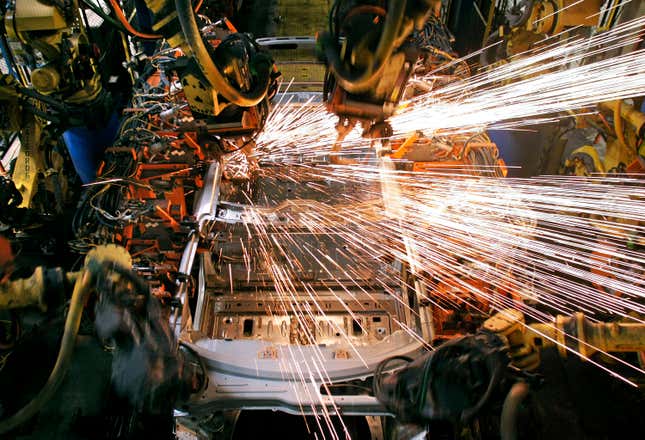
In This Story
General Motors (GM-4.40%) and the Hyundai Motor Co. said on Thursday that they had agreed to explore a partnership to slash costs and make new clean-energy vehicles amid a tough market.
The two automakers said they aim to work together on internal combustion, hydrogen, and electric-powered commercial and passenger vehicles. They also plan to review ways to combine their sourcing for raw materials needed to make electric vehicle batteries, such as lithium, as well as steel and other materials.
GM and Hyundai have signed a non-binding agreement called a memorandum of understanding and said they would begin exploring a partnership immediately. However, they didn’t specify any key markets that a pairing up would focus on or how much time was allocated to exploring a deal.
“GM and Hyundai have complementary strengths and talented teams,” GM CEO Mary Barra said in a statement. “Our goal is to unlock the scale and creativity of both companies to deliver even more competitive vehicles to customers faster and more efficiently.”
Hyundai Executive Chair Euisun Chung said in a statement that the deal will allow both companies to make themselves more competitive in key markets and become more cost-effective.
For GM, the deal comes after the Detroit automaker has tried to lower expectations for its EV sales going forward.
Although it did record almost 22,000 EV deliveries last quarter, about 40% compared to a year earlier, comments by Barra in July cast doubt on its goal of making 1 million EVs in North America by the end of the year. The automaker has said it will “build to demand” and is scaling production of the electric Chevrolet Equinox.
The company’s planned battery plant in Indiana was recently delayed by about a year, to 2027, and its plans for a new Buick EV have also been pushed back. That somewhat mirrors things at rival Ford Motor Co., which has pushed back some EV plans in favor of focusing on hybrid cars as it continues to lose money on its electric business.
GM also has a decades-long history in South Korea, where its tie-up with Daewoo Motors has struggled in recent years. Hyundai Motor Group’s (HYMTF-1.90%) brands made up more than 90% of new vehicles made in South Korea last year, while GM’s branch held less than 3% of the market, according to The Chosun Daily.
Hyundai’s EV and hybrid sales in North America have been strong in recent months, with almost 27,000 Ioniq 5 models being sold through August, up 26% compared to the same period last year. However, the company is being sued by a group of dealers who allege the company has fudged its sales numbers. Hyundai has said it does not condone falsifying data and opened an investigation into the claims.
The South Korean automaker recently fast-tracked its plans for a new $7.59 billion factory in Ellabell, Georgia, and plans to build a $5 billion EV battery plant in Bartow County. Once operational, Hyundai expects to build 300,000 EVs annually, across its Kia, Hyundai, and Genesis brands. Those vehicles are expected to qualify for the federal EV tax credit; an existing factory in Alabama makes models that don’t yet qualify, including the GV70 electric SUV.